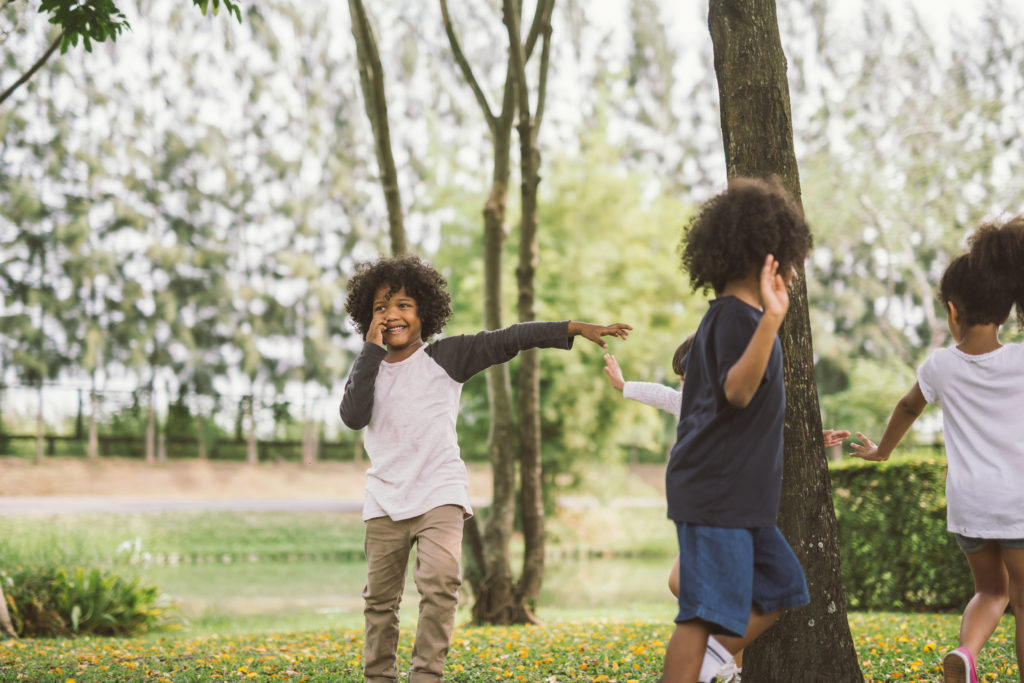
So, a simple cheap way to help your kids improve all life skills and strengthen mental wellbeing. Too good to be true?
Well, this piece of research, just out, finds a fascinating correlation with mental health and kids. This correlation was also surprising – some things kids do, and their personality traits, we can assume could be related to positive mental health. Traits such as extraversion meaning you are likely to bond closer to people and hence this can provide support networks. So, what did these researchers around Helen Dodd from the University of Essex in the UK find?
The researchers surveyed 2’346 parents pre covid and during the first covid lockdown in the UK with questions on general mental health and mood. They found that those kids who spend more time playing outside in more unstructured and adventurous games had fewer “internalising” problems i.e. anxiety and depression during the first covid lockdown.
What’s more this effect was more pronounced in children from lower income families.
This highlights the importance of play – I have written in other places of how beneficial play is for multiple reasons. Basically, it is one of the best ways to build your brain. But importantly it is free and actually easily accessible for most people.
Adventurous play according to this also seems to be important because it uses cognitive skills that are very important such as exploration but also risk balancing and likely also failure and recovery and trying again. Critical life skills – but this also seems to have a buffer against mental health issues and that is really important to note.
This shows that some of things we can do as a society are cheap and easily accessible – but society can also encourage this through giving access to parks and well-designed play areas.
So as a parent you should be encouraging your kids to get out and play – and hey, there’s nothing wrong with you adults doing it also!

Andy Habermacher
Andy is author of leading brains Review, Neuroleadership, and multiple other books. He has been intensively involved in writing and research into neuroleadership and is considered one of Europe’s leading experts. He is also a well-known public speaker speaking on the brain and human behaviour.
Andy is also a masters athlete (middle distance running) and competes regularly at international competitions (and holds a few national records in his age category).
Reference
Helen F. Dodd, Rachel J. Nesbit, Lily FitzGibbon.
Child’s Play: Examining the Association Between Time Spent Playing and Child Mental Health.
Child Psychiatry & Human Development, 2022;
DOI: 10.1007/s10578-022-01363-2
More Quick Hits
How Gratitude between Co-Workers Lowers Stress and Increases Performance
Quick HitsDaily brief research updates from the cognitive sciences ratitude is a nice thing to have, I think we all agree on that. But when it comes to the workplace some may see it is just being nice, and not being focused enough on the hard...
Brain Scans Can Predict Your Political Affiliation
Quick HitsDaily brief research updates from the cognitive sciences rain scanning of political partisans is not new and it has long been reported that brain scans can predict political affiliation. But those studies were scans of political partisans...
Children with Same-Sex Parents Are Socially Well-Adjusted
Quick HitDaily brief research updates from the cognitive sciences his is not the first study to report that children of same-sex parents are well adjusted, there are plenty, but it is one of the first to be representative and hence gives some...
Simple Exposure to New Things Makes Your Brain Ready to Learn
ouldn’t it be great if we could learn things with no effort? Well, actually we often do, and children learn vast quantities of information, and knowledge with little to no effort – think of how well we learn languages which become fiendishly...
So, Can Cranberries Improve Memory?
tend to be hesitant to report on studies of single foods doing amazing things (because many do), but this piece of research still caught my eye. So, what did this group of researchers from the University of East Anglia find? Well, they...
The Real Problem with Social Media: It Induces Dissociative States
Quick HitsDaily brief research updates from the cognitive sciences ocial media seems to hijack our brains – or at least according to popular narratives. Most of us have experienced this where you get stuck in an endless stream of content,...
So, Meditation Doesn’t Change Your Brain – Or Does It?
editation can actually change your brain. "Oh, no it can’t!" say these researchers. "Oh, yes it can!" say a lot of other researchers. Does this start to sound confusing? Well, it does because there has been plenty of evidence that...
The Life Factors that Make Lonely People Lonely
Quick HitsDaily brief research updates from the cognitive sciences ou may assume, logically at first glance, that not having contact to people is the most important factor in loneliness. And obviously this does have a large impact — but...
How Music Helps With Collective Grief
his study recently out analyses a fascinating episode in China at the start of the pandemic. A group of international musicians in Shenzhen produced a viral hit in China. This was a cover version of Michael Jackson's “you are not alone”...
Why it pays for companies to help workers have a good day in the office
usiness and executives in those businesses are more than keen to get a competitive advantage. To this end they invest heavily in technology and getting the right people to do the job. But, I am sure, we are all more than aware that the work...










